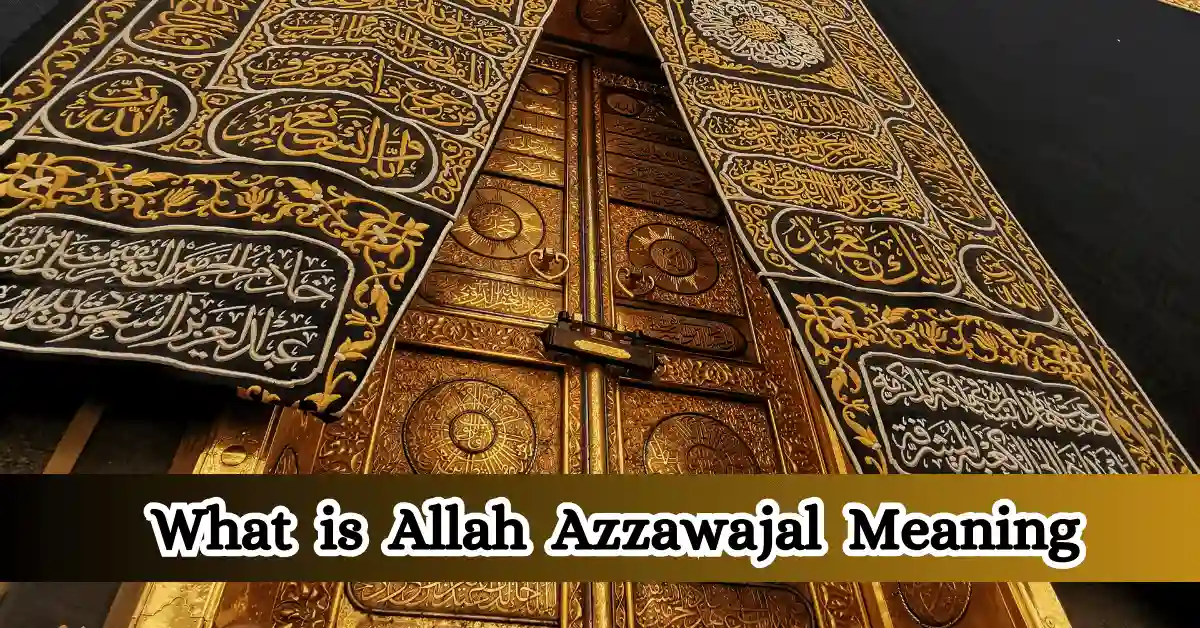“Allah AzzawaJal” is a reverential term used by Muslims to describe Allah, the One and Only God in Islamic belief, with attributes of might, majesty, and glory. This phrase is rooted in the rich theological and linguistic traditions of Islam. Let’s delve into an introduction to the meaning and significance of “Allah Azza wa Jal”:
Allah Azzawajal Meaning
“Allah Azza wa Jal” (الله عز وجل) is an Arabic phrase used by Muslims to refer to Allah with attributes of might, majesty, and glory. Here’s a breakdown of the components of the words:
- Allah (الله) is the Arabic name for God, the Supreme Being in Islamic belief. It is used exclusively to refer to the One and Only God in monotheistic worship.
- Azza wa Jal (عز وجل):
- Azza (عز): This term conveys the concept of might, honor, and power. When used in reference to Allah, it emphasizes His absolute greatness and invincibility.
- Wa Jal (وجل): “wa” means “and,” and “Jal” conveys the concept of majesty and glory. Together, “wa Jal” emphasizes Allah’s majestic and glorious nature.
Translation: “Allah, the Mighty and Majestic.”
Usage
- “Allah Azza wa Jal” is often invoked by Muslims to express awe, reverence, or praise Allah’s greatness.
Significance
- The phrase emphasizes the holy and transcendent nature of Allah, highlighting His incomparable might, honor, and glory.
It’s important to note that these attributes are understood in the context of Islamic theology, and the phrase is used as a way to express profound respect and acknowledgment of the greatness of Allah in accordance with Islamic beliefs.
Cultural and Spiritual Context
- This phrase is deeply ingrained in Islamic theology and is commonly used in prayers, supplications, and expressions of praise and worship.
- It reflects the monotheistic belief in the oneness of Allah and His attributes as described in the Quran and the traditions of Prophet Muhammad (peace be upon him).
In summary, “Allah Azza wa Jal” profoundly expresses respect and acknowledgment of Allah’s greatness in Islamic culture. It encapsulates the belief in Allah’s might, honor, majesty, and glory, fostering a deep sense of reverence and devotion among Muslims.
Allah Azzawajal, Meaning in all languages
The phrase “Allah Azza wa Jal” is specific to Arabic and Islamic contexts, and it is not directly translated into other languages. However, the meaning can be conveyed in various languages to capture the essence of the attributes of might, majesty, and glory ascribed to Allah in Islamic theology. Here’s an attempt to express the meaning in several languages:
Translations
- English:
- “Allah, the Mighty and Majestic.”
- “Allah, the Mighty and Glorious.”
- Urdu:
- “اللہ، عظیم و جلیل” (Allah, Azeez o Jalil).
- Indonesian/Malay:
- “Allah, Yang Maha Perkasa dan Maha Agung.”
- “Allah, Yang Maha Perkasa dan Maha Mulia.”
- French:
- “Allah, le Puissant et le Majestueux.”
- “Allah, le Puissant et le Glorieux.”
- Spanish:
- “Allah, el Poderoso y el Majestuoso.”
- “Allah, el Poderoso y el Glorioso.”
- German:
- “Allah, der Mächtige und Majestätische.”
- “Allah, der Mächtige und Herrliche.”
- Turkish:
- “Allah, Azîz ve Celîl.”
- “Allah, Azîz ve Şanlı.”
- Bengali:
- “আল্লাহ, মহা শক্তিশালী এবং মহৎ.” (Allah, Maha Shaktishali ebong Mohat)
- “আল্লাহ, মহা মহিমান্বিত এবং মহৎ.” (Allah, Maha Mahimanvit ebong Mohat)
Please note that these translations aim to convey the meaning rather than providing exact linguistic equivalents. The emphasis is on expressing the attributes of might, majesty, and glory ascribed to Allah in various languages.
SAY ALLAH AZZAWAJAL in Sentences?
The phrase “Allah Azza wa Jal” is not commonly used in everyday speech by Muslims. Instead, it is a form of reverence and acknowledgment of Allah’s attributes and is often used in specific contexts within Islamic practices. Here are instances when you might encounter or use the phrase:
- Recitation of the Quran:
- “Allah Azza wa Jal” is not explicitly mentioned in the Quran itself. Still, Muslims often express similar sentiments of reverence and awe when reciting verses that describe Allah’s attributes, might, and majesty.
- Dua (Supplication):
- When making supplications or asking Allah for guidance, forgiveness, or blessings, Muslims may use phrases such as “Allah Azza wa Jal” to acknowledge His greatness and seek His mercy.
- Spiritual Discourse:
- Scholars and speakers might use the phrase in lectures, sermons, or discussions about Allah’s attributes and the concept of His might and majesty in Islamic theology.
- Praise and Worship:
- In moments of praise and worship, whether during prayer or other acts of devotion, Muslims may use expressions like “Allah Azza wa Jal” to reflect on Allah’s divine qualities.
- Islamic Literature:
- The phrase is sometimes used in written or spoken Islamic literature to emphasize the grandeur and majesty of Allah.
- Adoration and Gratitude:
- Muslims may express admiration, adoration, and gratitude to Allah by using phrases that highlight His attributes, such as “Allah Azza wa Jal.”
It’s important to note that while the phrase itself is not used extensively in daily conversation, the attributes it represents, such as might, majesty, and glory, are often invoked in various forms in Islamic practices as a way of deepening one’s connection with Allah. The choice of words may vary, but the intent is to express reverence and acknowledgment of the greatness of the Divine.
